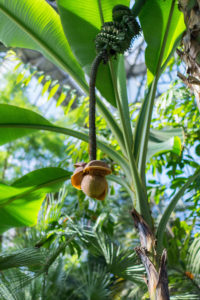Xia and I frequently rode the rails across central and north China. Our primary hunting grounds were the vast Daba Mountains for Citrus, Kadsura, Xantholylum and Schisandra at their most northerly range, craggy and steep Qinling of Shaanxi province with its specialized cuisines based on local plants and developed by monks over a thousand years. Rainy Guizhou province captured our imagination with mysterious Dong and Miao ethnicities who had been harvesting Kadsura from the wild for 400 years. The windy dry corridors of Gansu seemed desperately poor, isolated, and haunting. There, a million families still live in caves and rock shelters set into eroded pink canyon walls where great rivers had once run.

Between Gansu and Qinghai, a deserty badland appears, and yet farmers still manage to tend plots of cold-hardy basjoo banana in the subzero deserts. This plant is used by the locals for its 12-foot-long strands of soft fabric suitable for bedding or cordage and for which they called the “Giants Hemp”. We crossed the breadbasket of Sichuan, and into its forested villages by horseback or foot. We slept on bamboo mats in minority villages where illicit poppies are sown, and gunpowder is still made from dried buffalo urine and sulfur. We ate pork fat and greens with polygamous women who owned farms and businesses and passed down those fortunes to daughters in remarkably tidy matrilineal villages. We hitchhiked south on coal trucks or military convoys to Guanxi and Yunnan which yawned more sleepily the farther south we went.
As China opened to the west, cities like Chengdu, Kunming, and Jinhong were teaming with progressive young business owners with piles of cash flowing from their worldwide exports. We made basecamp inside their nightclubs or garment factories. We drank watery beer and ate hot-pot with Tibetans in exile, many of whom had moved to Chengdu after murderous crackdowns in the kingdom of Chamdo. Eventually, two years had elapsed. And by then Xia and I were captivated by whispers from hill tribes in Guizhou and Yunnan; a mythical fruit existed they told us, hidden in craggy realms, and lost in the branches of trees; the God Peach; a Red Diamond; a Black Dragon Crossing.
This scandent climber had broad evergreen leaves and twining arms that could reach 70 feet into the canopy of forests. Endemic to regions of rainy summers and cool winters, it grew at 2,000 to 6,000 feet elevation. Snow could fall as early as October or November; yet perfectly ripen a peach-flavored fruit.
Scouring our botanical tomes- we accidentally acquired some in Nanjing, and then xeroxed and stuffed them into our rucksacks- there was nary a mention. Rarely described and eluding commercial development, the fruit was unknown in published photographs. It was shade-loving to the point of being photophobic- thriving with just 20% of the sunlight needed by any other temperate fruit. Its forested lands were also home to Tibeto-Burman and Hmong-Mien people; Hani, Naxi, Wa, Maio, and Lahu tribes, who had been relegated to highlands above the valley floors, each with their own language. Their villages were often guarded by spirit gates constructed to ward off enemies and malevolent spirits. Placed over pathways and dangling with knives or animal bones, the gates were interwoven with geodesic iconography and painted with bloody curses. Permission to pass through them could be given by village headmen who presided over beautiful biomes where Mandarin was seldom spoken.
Xi and I began obsessing over this fruit. The less printed information we uncovered, and the fewer experts who heard of it, combined with the difficulty to discover in situ, the more paramount it became in our wandering through China.
Xia and I deduced it was indeed a fruit of immortality, rich in medicinal properties; a mythical peach the size of a cantaloupe; the morphological structure of a giant’s raspberry; the skin of a fiery dragon. If true to description, it would be the perfect garden companion for great swaths of American soil.
“Someone lives in a mountain gorge
cloud robe and sunset tasselsholding sweet plants he would share
but the road is long and hardburdened by regrets and doubts
old and unaccomplished
called by others crippled
he stands alone determined”HAN SHAN, Tang Dynasty (618-907)